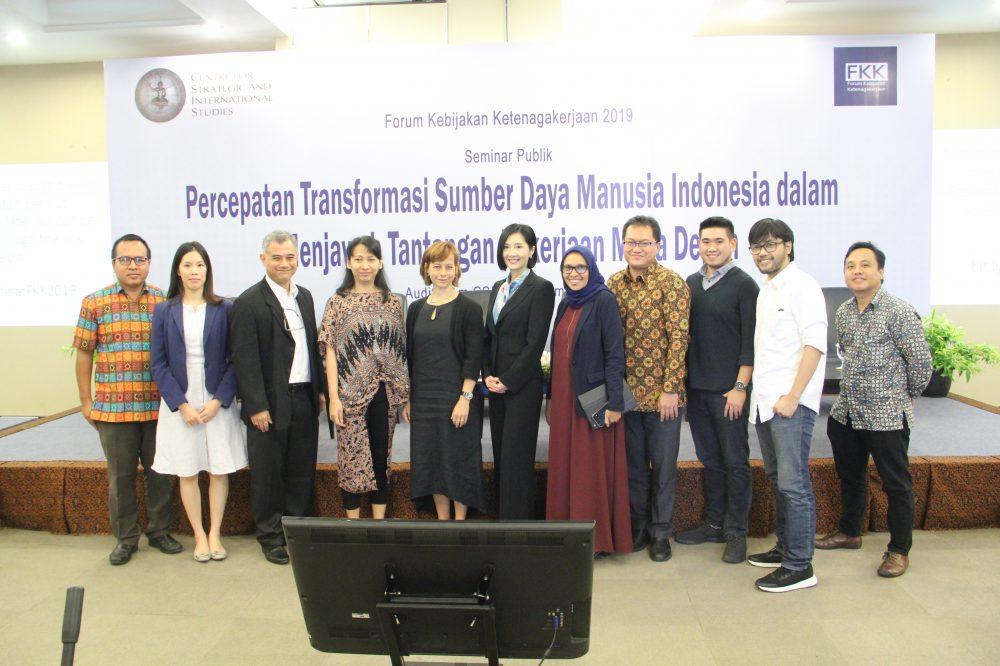The final in a series of dissemination events presenting the policy recommendations and research from The Transformation of Work project took place on Tuesday, December 3, 2019 in Jakarta, Indonesia.
Christina Schönleber, Director (Policy and Programs) talked in the opening of the Forum about the research conducted by APRU on the impact of automation on the future work on the society and the economies across the Asia Pacific region. The research is available in the APRU published book titled “Transformation of Work in Asia-Pacific in the 21st Century”.
Digitalization and automation are transforming the world on unprecedented scale and speed, and the impacts are felt in all levels of society. Additionally, recent technological advances such as AI-driven innovation and machine learning require a new set of skills for the future workforce. The future workforce will see the transformation of jobs as technological change creates surpluses of workers and skills in some occupations while creating demands for new skills and jobs in others. The Centre for Strategic and International Studies (CSIS), supported by Google, has conducted a serial of discussions and policy recommendations under Forum Kebijakan Ketenagakerjaan (FKK), a multi-stakeholder platform in labor issues through discussion and dissemination.
Yose Rizal Damuri (CSIS) opened the public seminar and introduce FKK which is to stimulate discussion, accommodate multi-stakeholders perspectives and formulate policy recommendations from evidence-based research. The forum has been successfully held and produce some fruitful debates among researchers, policymakers, the private sector and labor unions. After that, Christina Schönleber (APRU) explains that APRU has conducted a research on the impact of automation on the future work on the society and the economies across the Asia Pacific and held discussions between academia, governments, and industries. The objectives of the projects are to understand digital technology, automation challenges and benefits in relation to the future of work; inform the discussion among researchers, policy-makers and civil society on possible direction and solutions; and publish and widely disseminate a data-driven study with key focus on APAC region.
Faizal Yahya (National University of Singapore) explains that Singapore has a tiny workforce and an aging demographic. There is a growing fear of losing jobs and influx of foreign laborers which creates a negative impression that their jobs are taken away by foreigners. Also, it is necessary to create new jobs for old workers or to reskill them. To prepare for the changes in the future. The government has undertaken several initiatives. First, the government launched SkillsFuture in 2015 to give training to graduates and provide courses for reskilling especially for mature workers under the Ministry of Education. From the demand side, the Committee of Future Economy (CFE) created an Industry Transformation Map (ITM) and assigned different agencies to help different industries sectors since there are more SMEs than larger companies in Singapore. Thirdly, to support the manufacturing sector, the government establish Smart Industry Readiness Index (SIRI), which helps companies to architect their industry 4.0 roadmap through The Prioritization Matrix. Lastly, the government tried to solve the mature workers’ problem through Workforce Singapore (WSG) Adapt and Grow Initiative.
The Forum hosted speakers from Asian Institute of Management, National University of Singapore (NUS), The Centre for Strategic and International Studies (CSIS) and Association of Pacific Rim Universities (APRU), in addition to a number of Indonesian educational organizations.
The speakers addressed important topics related to the impact of recent technological advances (i.e. AI-driven innovation, machine learning, etc.) on the workforce. They highlighted main challenges faced by the workforce including obsolete education material, expiration of skills in the light of rapid technological changes, and heavy rates of young unemployment in Indonesia. “Education will have to be reimagined”, said Jikeyong Kang from the Asian Institute of Management.
The interactive talk-show panel drew participants’ attention to developing solutions to the discussed challenges. The expansion of the Indonesian Government effort to keep the education system updated and relevant to the industry demands was suggested. Meanwhile, continuous training of existing workforce is necessary to keep up with technological trends and deal with the lack of talent in certain fields.

